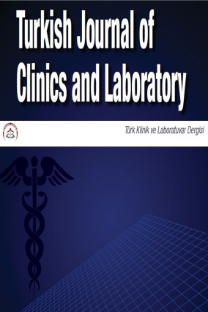Genç erkek hastada kanlı ishalin nadir bir nedeni; familial adenomatöz polipozise bağlı kolon kanseri
Familyal adenomatöz polipozis, kanlı ishal, anemi, kolon kanseri
A rare reason of bloody diarrhea in a young male patient; colon cancer due to familial adenomatous polyposis
Familial adenomatous polyposis, bloody diarrhea, anemia, colon cancer,
___
- Terzi C, Füzün M. Kolorektal polipler ve polipozis sendromları. Sayek D, editör. Temel Cerrahi. 3. Baskı. Ankara: Güneş Kitabevi; 2004. p.1234-42.
- Farahmand M, Özcan M, Çerçel A ve ark. Genel Cerrahi Ders Kitabı Cilt I ve II, Editör: Ertuğrul Göksoy, İstanbul, İstanbul Üniversitesi Yayın No:4892. p.888-930.
- Half E, Bercovich D, Rozen P. Familial adenomatous polyposis. Orphanet J Rare Dis 2009; 12; 4-22.
- Kadmon M. Preventive surgery for familial adenomatous polyposis coli. Chirurg 2005; 76: 1125-34.
- Lal G, Gallinger S. Familial adenomatous polyposis. Semin Surg Oncol 2000; 18: 314-23.
- Jerkic S, Rosewich H, Scharf JG, et al. Colorectal cancer in two pre-teenage siblings with familial adenomatous polyposis. Eur J Pediatr 2005; 164: 306-10.
- Tuna B, Menigatti M, Benatti P, et al. Investigation of APC mutations in a Turkish familial adenomatous polyposis family by heterodublex analysis. Dis Colon Rectum 2005; 48: 567-71.
- Nilson TI, Vatten LJ. Prospective study of colorectal cancer risk and physical activity, diabetes, blood glucose and BMI: Exploring the hyperinsulinemia hypothesis. Br J Cancer 2001; 84: 417-22.
- Wachtershauser A, Akoglu B, Stein J. HMG-coA reductase inhibitor mevastatin enhances the growth inhibitory effect of butyrate in the colorectal carcinoma cell line. Carcinogenesis 2001; 22: 1061-7.
- Hawk ET, Limburg PJ, Viner JL. Epidemiology and prevention of colorectal cancer. Surg Clin N Am 2002; 82: 905-41.
- Trowbridge B, Burt RW. Colorectal cancer screening. Surg Clin N Am 2002; 82: 943-57.
- Dorudi S, Steele RJ, McArdle CS. Surgery for colorectal cancer. British Medical Bulletin 2002; 64: 101-18.
- Killingback M, Barron P, Dent OF. Local recurrence after curative resection of cancer of the rectum without total mesorectal excision. Dis Colon Rectum 2001; 44: 473-83.
- Kocakuşak A, Yaşar MA, Güler N. Kolorektal kanserli 45 ve 45 yaş altı hastaların retrospektif değerlendirilmesi. Haseki Tıp Bülteni 2011; 49: 3.
- Derici H, Tansuğ T, Reyhan E. Familyal adenomatöz polipozis: üç kardesin sunumu. Türkiye Klinikleri J Med Sci 2007, 27: 629-32.
- Polymnia Galiatsatos MD, William D Foulkes MB. Familial adenomatous polyposis. Am J Gastroent 2006; 101: 385-398.
- Meyerhandth JA, Mayer RJ. Follow-up strategies after curative resection of colorectal cancer. Semin Oncol 2003; 30: 349-60.
- Sugage Zua M. Familial adenomatous polyposis syndrome: a case report. Hospital Physician 1999; 7: 61-68.
- Half E, Bercovich D, Rozen P. Familial adenomatous polyposis. Orphanet J Rare Dis 2009; 4: 22.
- ISSN: 2149-8296
- Yayın Aralığı: 4
- Başlangıç: 2010
- Yayıncı: DNT Ortadoğu Yayıncılık AŞ
Konvansiyonel Heaney Tekniği ile On-Basamak Vajinal Histerektomi Tekniğinin Karşılaştırılması
ÜMİT GÖRKEM, CİHAN TOĞRUL, Hasan Ali İNAL, Tayfun GÜNGÖR
Lenf ödem ve kompleks boşaltıcı fizyoterapi
İdrar yolu enfeksiyonlarından izole edilen Pseudomonas Aeruginosa’larda antibiyotik direnci.
Halil ER, Merve ŞEN, Mustafa ALTINDİŞ
AYDIN ÇİFCİ, HÜSEYİN ÖZDEN, SERAP BİBEROĞLU, SELİM YALÇIN, Bülent KALAYCI, Mehmet İBİŞ
Sağlık Bilimleri Fakültesi Birinci Sınıftaki Kız Öğrencilerin Genital Hijyen Uygulamaları
ŞENAY TOPUZ, NURİYE BÜYÜKKAYACI DUMAN, AYLİN GÜNEŞ
İdrar yolu enfeksiyonlarından izole edilen Pseudomonas Aeruginosa’larda antibiyotik direnci
Halil ER, Merve ŞEN, MUSTAFA ALTINDİŞ
Baş boyun tümörlerinde PET/BT kullanımı
Ali AÇIKALIN, Zeynel ÖZTÜRK, Melih ÇAYÖNÜ, Aydın ACAR
Baş ve boyun kanserlerinde Pozitron Emisyon Tomografisi/Bilgisayarlı Tomografi (PET/BT)
Positron emission tomography/computed tomography (PET/CT) in the head and neck
